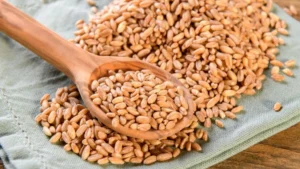Table of Contents
Wheat Berries: Uncovering the Nutritional Powerhouse for Better Health
From breakfast bowls to salads and even side dishes, wheat berries are emerging as a staple in many kitchens worldwide. Unlike processed grains, wheat berries retain their nutrients, offering a range of health benefits that processed white flour simply cannot match. In this article, we’ll delve into the unique advantages of wheat berries, how they compare to refined grains, and why you might consider making them a regular part of your diet.

Wheat Berries: Nutritional Powerhouse and Health Benefits
What Are Wheat Berries?
Wheat berries, also known as wheat kernels, are the whole grain form of wheat. They contain the bran, germ, and endosperm, each packed with nutrients like fiber, protein, and essential vitamins. Unlike refined grains, which lose the bran and germ during processing, wheat berries provide a complete source of nutrients. According to research by Harvard School of Public Health, whole grains such as wheat berries are associated with a reduced risk of chronic diseases.
Why Refined Grains Are Different
Refined grains undergo milling processes that strip away the nutrient-rich bran and germ, leaving only the endosperm. While this improves shelf life and provides a softer texture, it also removes many healthful components. Modern roller mills have amplified this process, producing grains with fewer nutrients. Choosing whole grains like wheat berries, however, can support your overall well-being by delivering a range of health benefits.
Nutritional Profile of Wheat Berries
A serving of wheat berries (about 48 grams) contains significant amounts of fiber, protein, manganese, zinc, and a variety of essential vitamins and minerals. Here’s a breakdown of the nutrients you’ll find in a quarter-cup serving of wheat berries:
- Calories: 170
- Total Carbohydrates: 32 g
- Fiber: 4 g
- Total Fat: 1.5 g
- Protein: 9 g
- Manganese: 1.4 mg (61% DV*)
- Zinc: 2.3 mg (21% DV)
- Phosphorus: 200 mg (16% DV)
- Magnesium: 60 mg (14% DV)
- Niacin: 2 mg (13% DV)
- Vitamin B6: 0.2 mg (12% DV)
Wheat berries also contain beneficial amounts of copper, selenium, folate, and vitamin E, all crucial for maintaining optimal health.
Health Benefits of Wheat Berries
1. Promote Digestive Health
With their high fiber content, wheat berries support healthy digestion. Fiber adds bulk to stool, which helps regulate bowel movements and may prevent conditions like constipation. A study published in the World Journal of Gastroenterology found that increasing fiber intake can benefit those with digestive issues, helping to improve stool frequency and alleviate symptoms of constipation.
2. Support Cardiovascular Health
Consuming whole grains like wheat berries may contribute to heart health by lowering cholesterol levels. Studies have shown that a higher intake of dietary fiber is linked to a lower risk of cardiovascular disease. In fact, research by the Tulane University School of Public Health demonstrates that fiber can help manage cholesterol, reducing bad LDL cholesterol while maintaining good HDL cholesterol.
3. Aid in Blood Sugar Management
The fiber in wheat berries slows the absorption of sugar into the bloodstream, helping to regulate blood sugar levels. A large-scale study published in PLoS Medicine revealed that a diet rich in whole grains may significantly lower the risk of type 2 diabetes by improving glycemic control and promoting better insulin sensitivity.
4. Contribute to Weight Management
Wheat berries are a nutrient-dense, low-calorie food ideal for those aiming to lose weight. The combination of fiber and protein in wheat berries can increase satiety, helping you feel full longer and potentially reducing overall calorie intake. This makes wheat berries a smart addition to any weight management plan, as they may reduce cravings and prevent overeating.
5. Strengthen Bone Health
Wheat berries are rich in manganese, a mineral essential for bone formation and cartilage health. Consuming manganese and other minerals like phosphorus and magnesium from whole grains like wheat berries can support bone density and reduce the risk of osteoporosis as you age.
6. Prevent Iron-Deficiency Anemia
Iron is vital for red blood cell production, and wheat berries provide a solid source of this mineral. Including iron-rich foods like wheat berries in your diet can help prevent anemia, especially when paired with vitamin C-rich foods that enhance iron absorption.
How to Incorporate Wheat Berries into Your Diet
Adding wheat berries to your meals is simple. They are versatile and can be used in place of other grains like rice or quinoa. Here’s a quick guide to cooking wheat berries:
- Bring water to a boil, then add wheat berries.
- Let simmer for about an hour until tender.
- Drain any remaining water, and they’re ready to serve.
Cooked wheat berries can be stored for up to a week, making them perfect for meal prep. Use them in salads, soups, and grain bowls or grind them into flour for baking. If you’re looking to add a nutritional boost, try growing wheatgrass from wheat berries for juicing or smoothies.
Comparing Wheat Berries and Wheat Germ
While wheat berries contain all parts of the wheat kernel, wheat germ only includes the nutrient-dense germ. Wheat germ is high in calories and offers a slightly higher protein and fiber content per ounce, making it a good alternative for smoothies and oatmeal toppings. However, wheat berries are more versatile and can be swapped into a broader range of recipes as a whole grain.
Possible Risks and Considerations
Although wheat berries are packed with nutrients, they do contain gluten, which may trigger reactions in individuals with celiac disease or gluten sensitivity. If you experience adverse reactions like digestive discomfort or itching, consult with a healthcare provider.
Final Thoughts on Wheat Berries
Wheat berries offer a complete package of protein, fiber, and essential vitamins and minerals, contributing to heart, digestive, and bone health, as well as weight management and blood sugar control. Incorporating them into your diet alongside other whole grains can enhance overall health and well-being.